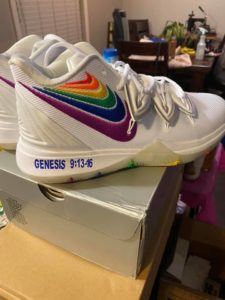Knock-offs and trademark infringements are no anomalies in today’s society. There are many counterfeiters in the world who attempt to pass off the creation or trademark of another as their own. While no brand is exempt from being the target of intellectual property infringement – neither is God, our Creator.
When God created the rainbow as a sign of His covenant between Him and every living thing on earth, He specifically called it “My” rainbow. But, that hasn’t stopped the influence of a devil scorned to pervert the rainbow into a celebration and sign of the LGBTQ community and gay pride, as seen in the rainbow flag originally designed by Gilbert Baker.
God said in Genesis 9:13-16 NKJV:
13 I set My rainbow in the cloud, and it shall be for the sign of the covenant between Me and the earth.
14 It shall be when I bring a cloud over the earth, that the rainbow shall be seen in the cloud;
15 and I will remember My covenant which is between Me and you and every living creature of all flesh; the waters shall never again become a flood to destroy all flesh.
16 The rainbow shall be in the cloud, and I will look on it to remember the everlasting covenant between God and every living creature of all flesh that is on the earth.
Yet, with worldwide acceptance of the rainbow and the rainbow flag as a symbol of pride for the LGBTQ community, many in the Kingdom of God shy away from wearing, promoting, or being a champion of the rainbow mainly due to the effectiveness and acceptance of the infringement on the rainbow’s purpose and meaning.
But, one young teammate in La Habra, California has decided to be true to God and stand for God’s ownership of the rainbow.
Teen Takes a Stand for God’s Rainbow

Marcus Works, a fifteen-year-old freshman on the junior varsity basketball team at La Habra High School, took a stand for God and His rainbow in a recent basketball game.
Playing basketball since the age of 4, Marcus loves the Nike Kyrie 5 shoes – but decided to add his own touch to the 6-swoosh, rainbow shoes. To the sole of the shoe, Marcus added the scripture “Genesis 9:13-16” in blue to declare God’s sovereign ownership of the rainbow.
“The rainbow is God’s promise to us, not solely for a particular culture to use as their symbol. My son wanted to get that message out“, says mom, Tracee, who supports her son 100%.

Between schoolwork and basketball practice, we briefly caught up with teammate Marcus, who told us that he came up with the idea to add the scripture to his shoes to show how “…God truly made the rainbow. I chose these shoes because I’m a basketball player, and I’m known for my ‘shoe game’. I knew that my shoes would draw people’s attention.”
When asked how he would encourage more youth to take a stand for God and share or express their faith today, Marcus encourages fellow young believers to:
“Be creative in your own way. If you want to take a stand for Jesus Christ, show it through what you like.”
Team, let’s continue to pray for Marcus and his family, that they would continue to be unafraid and unapologetic in their stand for the Kingdom of God. What can we all learn from Marcus’ simple act of faith?





Totally awesome to hear of his bravery to stand up for God. I’m tired of these worldly people acting as if they are gods and worshipping themselves.
Praise the Lord! You will be rewarded for standing up for the true meaning of the 🌈!
Wish more people would stand up!